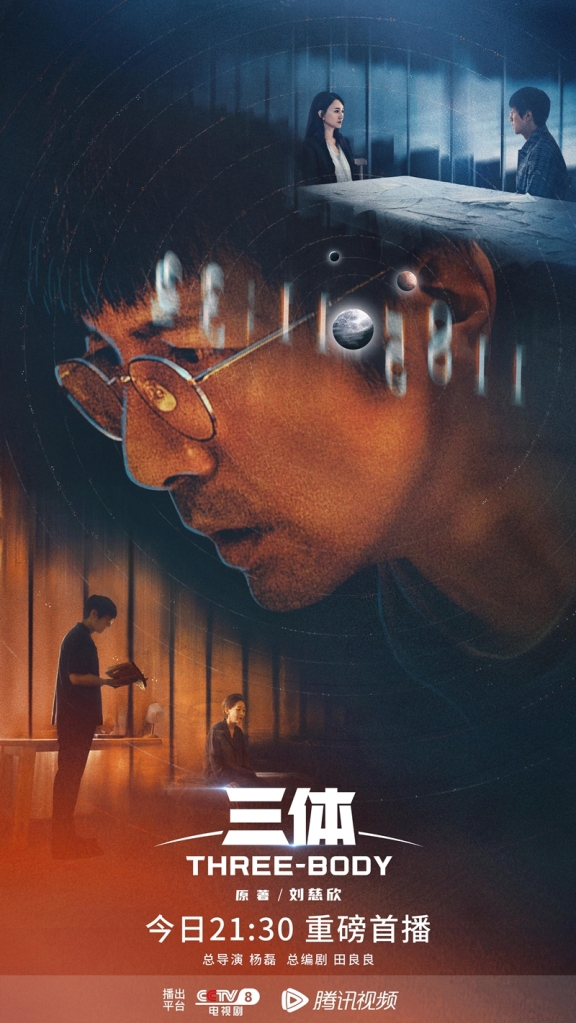timespace coordinates: 1960s/70s China (during the Cultural Revolution) to the end of the universe (in the 3rd volume of Remembrance of Earth’s Past – Chinese SF trilogy by Liu Cixin).

| Written by | Tian Liangliang |
|---|---|
| Directed by | Yang Lei and Vincent Yang |
I recommend watching the Chinese original first. It has EN subs, it takes a bit to adapt to the pace, designs, and acting styles, jokes, etc. but I guarantee it will be a blast. It was produced by CCTV, Tencent Video, Three-Body Universe, Migu Video, and Linghe Culture and represents a primer in Chinese TV productions. It is fast-paced and edgy, reminding us how similar and cinematic are manhua‘s (or manga/manhwa) and how easy it is to use it as a movie storyboard.

I am tying not to be a purist or a cultural essentialist, od making the case for China’s exceptionalism but let us pause the Netflix inevitability in order to enjoy the original. Yes, it’s spectacular & entertaining, but I think that the UK or Netflix adaptation should be viewed critically on 3 accounts, considering how previous adaptations were quite shallow in comparison with the non-Western Asian originals (not to mention various Techno-Orientalist trappings)
- Taking into account the previous Hollywood adaptations of Asian horror classics – say The Ring, The Grudge, The Eye, that are not only watered-down, Westernized versions of the original, but they all enact a sort of deletion (becoming canonic) instead of the turning more attention to the original material. Accordingly, this appropriation and adaptation is mostly triggered by money- and catering to Western tastes, ignoring its historically materialist setting – as part of the Japanese Miracle and “Confucian Belt” Tiger Economies (Ju-On, Ringu, Gin gwai respectively) propped up but also disciplined by the US. The same I would argue for the Liu Cixin Remembrance of Earth’s Past – the decision of the producers to place it in the UK rather than China speaks volumes. I mention this while agreeing with the fact that internationalizing such productions is essential to growing their core audience, especially for getting Chinese SF more popular abroad. So, while agreeing it is good to decontextualize the Chinese original, I think that the source material should get more visibility.
- The original Three-Body (三体) was originally free of charge and available on the YT channel, and it was hailed by some cultural critics as one of the most accurate, adult and canonic SF series ever made. Three-Body (三体) was in complete contrast with the usual (very entertaining but also quite infantilizing) Disney-Lucasfilms SF productions (SW extended universe – think The Mandalorian). Charles Mudede in particular was very vocal in making clear that a Hollywood adaptation would not invest money in a book trilogy that is so complicated, so dark and so complex and stick to it, especially because it “provides a solid introduction to the key ideas of a discipline that went into decline in the US around the mid-1970s, physics.” Well now that series is here, it is time to go for the original.
- Again, as mentioned previously on Timespacewarps we should not narrow down the scope of our cultural opening. During the XX century the West celebrated China’s “opening up”, which meant opening up to US/Europ-Atlantic liberalism and its financial institutions (see admission into WTO and Clinton’s China Trade Bill speech), but also buying into democratic values, and eventually becoming the World’s Shopfloor. This is not to say we should encourage Chinese exceptionalism. Yet it’s most banal and easy to mold everything into Anglo – American topoi. Ehy try to expunge differences, divergences, and specificities in order to make more of the same for the home market? It the aim – as was the original aim of its producers and ths crazy story behind it – is to produce a similar IP to the Lucasfilm SW, then go ahead – expand the universe! It’s anyway a very narrow and incestuous media world we’re living in. I say this also in regard to the Hollywood Dream factory record of casting incredibly discriminatory and stiff characters in the roles of Asians, Arabs, or Soviets agents during the Cold War. Do we need more Western versions of Asian movies/series or should we help translate or disseminate existing productions more throughly? What the hell happened to Own Voice.
So here is episode 1 of the original Chinese series with pretty decent EN subtitles. It is very high quality and it has a very good cast. The whole story is woven around an interplay btw history (or historical materialism), the natural sciences, and ideology – a debate inaugurated one might say by the paper of Boris Hessen at the 1931 Second International Congress for the History of Science in London where he delivered “The Socio-Economic Roots of Newton’s Principia Mathematica”.

This series is incredibly paced, and it contains some incredible scenes from the Observatory during the Cultural Revolution – it is really a good way to get acquainted with what would be termed the geo-military concept Third Front – of trying to industrialize China’s rugged interior and agricultural regions, in the midst of a double whammy: the fear of that China’s industrial and military infrastructural core would be vulnerable in the event of invasion by the Soviet Union or air raids by the United States (yeah after the Sino-Soviet split things looked very differently). The series is also an exception in the way it depicts a multiracial, multinational planetary governance that is trying to respond to this alien threat.

After the US rapprochement and as national defense considerations waned, the pace of building up the interior according to guiding principles of “Close to mountains, dispersed, hidden” (kaoshan, fensan, yinbi) declined and many plants went bankrupt in the 1980s (of course many got built in a hurry and were as a consequence quite defective). This does not mean some of them got an afterlife as private enterprises.

Anyway, it is important to watch such a series and the first batch of 30 eps (!) – out of consideration for its impact in China itself, where the Netflix adaptation is not streaming. Liu Cixin fans and Three-Body fans applauded the TV series on Douban (Rotten Tomatoes and Letterbox in one), where 449,000 viewers gave the show a high rating of 8.7. Below are some posters made for the anniversary edition -combined SF with traditional, vertical Chinese landscape painting, “shanshui hua” (literally painting of mountains, rivers, and cliffs).



